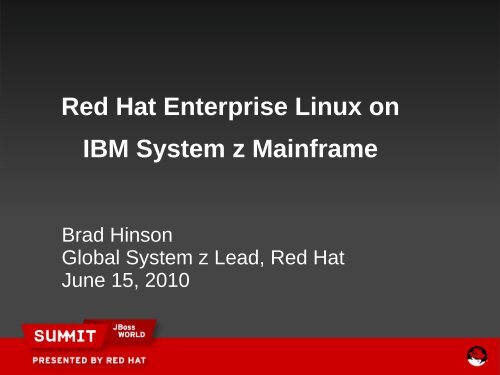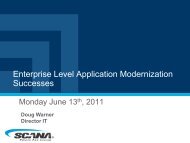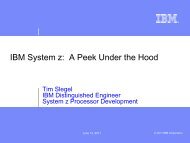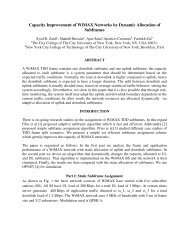Red Hat Enterprise Linux on IBM System z Mainframe
Red Hat Enterprise Linux on IBM System z Mainframe
Red Hat Enterprise Linux on IBM System z Mainframe
You also want an ePaper? Increase the reach of your titles
YUMPU automatically turns print PDFs into web optimized ePapers that Google loves.
<str<strong>on</strong>g>Red</str<strong>on</strong>g> <str<strong>on</strong>g>Hat</str<strong>on</strong>g> <str<strong>on</strong>g>Enterprise</str<strong>on</strong>g> <str<strong>on</strong>g>Linux</str<strong>on</strong>g> <strong>on</strong><br />
<strong>IBM</strong> <strong>System</strong> z <strong>Mainframe</strong><br />
Brad Hins<strong>on</strong><br />
Global <strong>System</strong> z Lead, <str<strong>on</strong>g>Red</str<strong>on</strong>g> <str<strong>on</strong>g>Hat</str<strong>on</strong>g><br />
June 15, 2010
Agenda<br />
● Overview<br />
● <str<strong>on</strong>g>Linux</str<strong>on</strong>g> <strong>on</strong> <strong>System</strong> z Development Process<br />
● Current Technology<br />
● Future Development
<str<strong>on</strong>g>Linux</str<strong>on</strong>g> Facts<br />
� Last year, 75% of the <str<strong>on</strong>g>Linux</str<strong>on</strong>g> code was developed by programmers working for<br />
corporati<strong>on</strong>s.<br />
� $7.37 billi<strong>on</strong>: projected cost to produce the 283 milli<strong>on</strong> lines of code which are c<strong>on</strong>tained<br />
in <str<strong>on</strong>g>Linux</str<strong>on</strong>g> Distributi<strong>on</strong> in a commercial envir<strong>on</strong>ment.<br />
� IDC forecasts show that <str<strong>on</strong>g>Linux</str<strong>on</strong>g> server revenue will grow by<br />
85.5% between 2008 and 2012 in the n<strong>on</strong>-x86 server space equalling a four<br />
year compound annual growth rate of 16.7%.<br />
� <str<strong>on</strong>g>Linux</str<strong>on</strong>g> is <str<strong>on</strong>g>Linux</str<strong>on</strong>g>, but …features, properties and quality differ dependent <strong>on</strong> your<br />
platform
Structure of <str<strong>on</strong>g>Linux</str<strong>on</strong>g> <strong>on</strong> <strong>System</strong> z<br />
Many <str<strong>on</strong>g>Linux</str<strong>on</strong>g> software packages did not require any code change to run<br />
<strong>on</strong> <str<strong>on</strong>g>Linux</str<strong>on</strong>g> <strong>on</strong> <strong>System</strong> z<br />
0.28 % platform specific code in GCC 4.1<br />
Backend GNU Complier Suite<br />
<str<strong>on</strong>g>Linux</str<strong>on</strong>g> Kernel<br />
Architecture<br />
Independent<br />
Code<br />
Memory<br />
Management<br />
Platform Dependent<br />
Code<br />
<str<strong>on</strong>g>Linux</str<strong>on</strong>g> Applicati<strong>on</strong>s<br />
GNU Runtime Envir<strong>on</strong>ment<br />
Process<br />
Management<br />
Backend<br />
Network Protocols Filesystems<br />
Generic Drivers<br />
HW Dependent Drivers<br />
ELS Instructi<strong>on</strong> Set and I/O Hardware<br />
1.81 % platform specific code in <str<strong>on</strong>g>Linux</str<strong>on</strong>g> Kernel 2.6.25<br />
0.55 % of<br />
platform<br />
specific code<br />
in Glibc 2.5
Who c<strong>on</strong>tributes to the <str<strong>on</strong>g>Linux</str<strong>on</strong>g> Kernel<br />
12.30%<br />
7.60%<br />
18.20%<br />
7.60%<br />
7.60%<br />
Source: <str<strong>on</strong>g>Linux</str<strong>on</strong>g> Foundati<strong>on</strong><br />
46.70%<br />
N<strong>on</strong>e<br />
<str<strong>on</strong>g>Red</str<strong>on</strong>g> <str<strong>on</strong>g>Hat</str<strong>on</strong>g><br />
Unknown<br />
<strong>IBM</strong><br />
Novell<br />
Other
<str<strong>on</strong>g>Linux</str<strong>on</strong>g> <strong>on</strong> <strong>System</strong> z Development<br />
Community<br />
● Development with “upstream” communities<br />
● Kernel, glibc, etc<br />
● Collaborati<strong>on</strong> with partners, <strong>IBM</strong>,<br />
open source c<strong>on</strong>tributors
<str<strong>on</strong>g>Linux</str<strong>on</strong>g> <strong>on</strong> <strong>System</strong> z Development<br />
Fedora<br />
● Bleeding edge, sets directi<strong>on</strong> for RHEL<br />
technologies<br />
● Community Supported<br />
● Released ~6mo cycles<br />
● www.fedoraproject.org
<str<strong>on</strong>g>Linux</str<strong>on</strong>g> <strong>on</strong> <strong>System</strong> z Development<br />
<str<strong>on</strong>g>Red</str<strong>on</strong>g> <str<strong>on</strong>g>Hat</str<strong>on</strong>g> <str<strong>on</strong>g>Enterprise</str<strong>on</strong>g> <str<strong>on</strong>g>Linux</str<strong>on</strong>g><br />
● Stable, mature, commercial product<br />
● Extensive Q&A, performance testing<br />
● Hardware & Software Certificati<strong>on</strong>s<br />
● 7yr maintenance<br />
● Core ABI compatibility<br />
guarantee<br />
● Major releases 2-3yr cycle
RHEL 5 <strong>on</strong> <strong>System</strong> z, Current Technology
Satellite deployment model<br />
●RHN Hosted<br />
● Software Distributi<strong>on</strong><br />
● Subscripti<strong>on</strong> Management<br />
API LAYER<br />
IT Applicati<strong>on</strong>s<br />
●RHN Satellite<br />
• Software Distributi<strong>on</strong><br />
• Account<br />
Management<br />
• Channel<br />
Management<br />
• M<strong>on</strong>itoring<br />
• Provisi<strong>on</strong>ing<br />
Custom C<strong>on</strong>tent<br />
� <str<strong>on</strong>g>Enterprise</str<strong>on</strong>g> management soluti<strong>on</strong> – enhanced c<strong>on</strong>trol<br />
� Local database stores all packages, profiles, and system informati<strong>on</strong><br />
� Syncs c<strong>on</strong>tent from RHN Hosted<br />
� Custom c<strong>on</strong>tent distributi<strong>on</strong><br />
� Can run disc<strong>on</strong>nected from the Internet<br />
MANAGED<br />
SYSTEMS<br />
WEB INTERFACE<br />
RHN Proxy
Satellite <strong>on</strong> Distributed <strong>System</strong>s
Satellite <strong>on</strong> <strong>System</strong> z
RHEL 5.4: Kernel<br />
● Support for Processor Degradati<strong>on</strong><br />
● Adds support for processor degradati<strong>on</strong>, which allows processor speed to be<br />
reduced in some circumstances (i.e. system overheating). This new feature<br />
allows automati<strong>on</strong> software to observe the machine state.<br />
● TTY Terminal Server Over IUCV<br />
● Provide central access to the <str<strong>on</strong>g>Linux</str<strong>on</strong>g> c<strong>on</strong>sole for the different guests of a z/VM.<br />
● The terminal server c<strong>on</strong>nects to the different guests over IUCV.<br />
● The IUCV based c<strong>on</strong>sole is ASCII based.<br />
● Fullscreen applicati<strong>on</strong>s like vi are usable <strong>on</strong> the c<strong>on</strong>sole.
TTY Terminal Server Over IUCV<br />
Network<br />
Terminal<br />
Sessi<strong>on</strong><br />
z/VM<br />
<str<strong>on</strong>g>Linux</str<strong>on</strong>g><br />
Terminal Server<br />
ts-shell<br />
iucvc<strong>on</strong>n<br />
<str<strong>on</strong>g>Linux</str<strong>on</strong>g><br />
z/VM<br />
IUCV HVC<br />
Device Driver<br />
z/VM<br />
IUCV HVC<br />
Device Driver<br />
<str<strong>on</strong>g>Linux</str<strong>on</strong>g><br />
IUCV<br />
<str<strong>on</strong>g>Linux</str<strong>on</strong>g><br />
z/VM<br />
IUCV HVC<br />
Device Driver<br />
z/VM<br />
IUCV HVC<br />
Device Driver<br />
<str<strong>on</strong>g>Linux</str<strong>on</strong>g>
Shared Kernel<br />
● Named Saved Segments (NSS)<br />
● Using NSS the z/VM hypervisior makes operating system code in shared real<br />
memory pages available to z/VM guest virtual machines.<br />
● With this update, <str<strong>on</strong>g>Linux</str<strong>on</strong>g> guest operating systems using z/VM can boot from the<br />
NSS and be run from a single copy of the <str<strong>on</strong>g>Linux</str<strong>on</strong>g> kernel in memory.<br />
<str<strong>on</strong>g>Linux</str<strong>on</strong>g> A<br />
mem=xxxx<br />
0 MB<br />
Shared Memory<br />
<str<strong>on</strong>g>Linux</str<strong>on</strong>g><br />
A<br />
Guest<br />
Storage<br />
vi<br />
bash<br />
<str<strong>on</strong>g>Linux</str<strong>on</strong>g><br />
B<br />
Guest<br />
Storage<br />
<str<strong>on</strong>g>Linux</str<strong>on</strong>g> NSS<br />
<str<strong>on</strong>g>Linux</str<strong>on</strong>g> B<br />
mem=xxxx
Shared Read-<strong>on</strong>ly Root<br />
read-<strong>on</strong>ly<br />
link<br />
<str<strong>on</strong>g>Linux</str<strong>on</strong>g> cl<strong>on</strong>e<br />
Gold/Master <str<strong>on</strong>g>Linux</str<strong>on</strong>g> Image<br />
file system<br />
(ext2)<br />
read-<strong>on</strong>ly<br />
link r/w<br />
file system<br />
(ext2)<br />
<str<strong>on</strong>g>Linux</str<strong>on</strong>g> cl<strong>on</strong>e<br />
<str<strong>on</strong>g>Linux</str<strong>on</strong>g> cl<strong>on</strong>e <str<strong>on</strong>g>Linux</str<strong>on</strong>g> cl<strong>on</strong>e
Problem: Double Paging<br />
● Issue for virtual memory Hypervisors<br />
● Hypervisor determines that it is short <strong>on</strong><br />
central storage and pages out a guest<br />
page<br />
● The guest determines that it wants to<br />
page out the same frame so the<br />
Hypervisor must page the frame back into<br />
central storage<br />
● The guest pages out the frame<br />
● This has been addressed by z/VM with<br />
Collaborative Memory Management<br />
A<br />
B<br />
C<br />
D<br />
<str<strong>on</strong>g>Linux</str<strong>on</strong>g> Paging<br />
3<br />
A<br />
B<br />
C<br />
D<br />
E<br />
F<br />
.<br />
<str<strong>on</strong>g>Linux</str<strong>on</strong>g> Guest<br />
z/VM Expanded Storage<br />
B<br />
B<br />
1<br />
z/VM Central Storage<br />
2
Cooperative Memory Management (CMM)<br />
● Problem scenario:<br />
● Virtual memory utilizati<strong>on</strong> exceeds<br />
real memory availability<br />
● z/VM paging operati<strong>on</strong>s become<br />
excessive<br />
● Overall performance suffers<br />
● Soluti<strong>on</strong>:<br />
● Real memory c<strong>on</strong>straint detected by<br />
z/VM Virtual Machine Resource<br />
Manager<br />
● <str<strong>on</strong>g>Linux</str<strong>on</strong>g> images signaled to reduce<br />
virtual memory c<strong>on</strong>sumpti<strong>on</strong><br />
● Demand <strong>on</strong> real memory is reduced,<br />
improving performance and<br />
throughput<br />
VMRM<br />
z/VM Memory<br />
z/VM<br />
Page<br />
<str<strong>on</strong>g>Linux</str<strong>on</strong>g><br />
Guest<br />
<str<strong>on</strong>g>Linux</str<strong>on</strong>g><br />
Guest<br />
<str<strong>on</strong>g>Linux</str<strong>on</strong>g><br />
Guest<br />
z/VM C<strong>on</strong>trol Program<br />
<str<strong>on</strong>g>Linux</str<strong>on</strong>g><br />
SWAP
<str<strong>on</strong>g>Linux</str<strong>on</strong>g> c<strong>on</strong>tinues to<br />
enable new ways of<br />
doing business<br />
Future <str<strong>on</strong>g>Linux</str<strong>on</strong>g> <strong>on</strong> <strong>System</strong> z Technology
<str<strong>on</strong>g>Linux</str<strong>on</strong>g> <strong>on</strong> <strong>System</strong> z Development Focus<br />
Applicati<strong>on</strong> Serving<br />
• z/OS integrati<strong>on</strong><br />
Data Hub<br />
Integrati<strong>on</strong><br />
• Database C<strong>on</strong>solidati<strong>on</strong><br />
Base Tasks<br />
Virtualizati<strong>on</strong> &<br />
Virtualizati<strong>on</strong> Management<br />
• Ease of Use<br />
• Serviceability<br />
• Hosting capacity<br />
Customer Requirements<br />
• Address customer observed deficiencies<br />
Competitiveness<br />
Virtualizati<strong>on</strong><br />
• Close competitive gaps<br />
• Differentiati<strong>on</strong> / innovati<strong>on</strong> that matters<br />
Security<br />
Security<br />
• Certificati<strong>on</strong>s<br />
• Data security &<br />
privacy<br />
Hardware Support<br />
C<strong>on</strong>tinuous Availability<br />
& Data Replicati<strong>on</strong><br />
• RAS<br />
• Differentiati<strong>on</strong> for<br />
missi<strong>on</strong> critical<br />
workloads<br />
• Exploitati<strong>on</strong> of new <strong>System</strong> z HW<br />
• Storage exploitati<strong>on</strong><br />
<str<strong>on</strong>g>Linux</str<strong>on</strong>g><br />
RAS<br />
• Maintainership & code currency
Advanced Virtualizati<strong>on</strong><br />
● Dynamic Memory Add/Remove (kernel 2.6.27)<br />
● Attach and use standby memory that is c<strong>on</strong>figured for a logical partiti<strong>on</strong> or z/VM<br />
guest.<br />
● Memory Attach & Detach requires running <str<strong>on</strong>g>Linux</str<strong>on</strong>g> <strong>on</strong> <strong>System</strong> z as a VM-guest<br />
requires z/VM 5.4 plus the PTF for APAR VM64524.<br />
● Standby CPU Activati<strong>on</strong>/Deactivati<strong>on</strong> (kernel 2.6.25)<br />
● Allow standby CPUs to be activated / deactivated<br />
● Extra Kernel Parameter for SCSI IPL (kernel 2.6.32)<br />
● Modify the SCSI loader to append append extra parameters specified with the<br />
z/VM VMPARM opti<strong>on</strong> to the kernel command line.
Advanced Virtualizati<strong>on</strong><br />
● hvc_iucv: Provide IUCV z/VM User ID Filtering (kernel 2.6.29)<br />
● Introduces the kernel parameter "hvc_iucv_allow=" that specifies a comma-<br />
separated list of z/VM user IDs.<br />
● If specified, the z/VM IUCV hypervisor c<strong>on</strong>sole device driver accepts IUCV<br />
c<strong>on</strong>necti<strong>on</strong>s from listed z/VM user IDs <strong>on</strong>ly.<br />
● Suspend / Resume (kernel 2.6.31)<br />
● With suspend and resume support, you can stop a running <str<strong>on</strong>g>Linux</str<strong>on</strong>g> <strong>on</strong> <strong>System</strong> z<br />
instance and later c<strong>on</strong>tinue operati<strong>on</strong>s.<br />
● When <str<strong>on</strong>g>Linux</str<strong>on</strong>g> is suspended, data is written to a swap partiti<strong>on</strong>. The resume<br />
process uses this data to make <str<strong>on</strong>g>Linux</str<strong>on</strong>g> c<strong>on</strong>tinue from where it left off when it was<br />
suspended.<br />
● A suspended <str<strong>on</strong>g>Linux</str<strong>on</strong>g> instance does not require memory or processor cycles.
Suspend/Resume Support<br />
● Ability to stop a running <str<strong>on</strong>g>Linux</str<strong>on</strong>g> <strong>on</strong> <strong>System</strong> z instance and later<br />
c<strong>on</strong>tinue operati<strong>on</strong>s<br />
● Memory image is stored <strong>on</strong> the swap device specified with a kernel<br />
parameter: resume=/dev/dasd<br />
● Lower root@larss<strong>on</strong>:~> the swap device grep priority swap for /etc/fstab the resume partiti<strong>on</strong><br />
/dev/dasdb1 swap swap pri=-1 0 0<br />
/dev/dasdc1 swap swap pri=-2 0 0<br />
● Suspend operati<strong>on</strong> is started with a simple echo:<br />
root@larss<strong>on</strong>:~> echo disk > /sys/power/state<br />
● Resume is d<strong>on</strong>e automatically <strong>on</strong> next IPL<br />
● Use signal quiesce to automatically suspend a guest<br />
ca::ctrlaltdel:/bin/sh -c "/bin/echo disk > \<br />
/sys/power/state || /sbin/shutdown -t3 -h now"
Kernel Scalibility<br />
● Scalability Limits – Maximum Values<br />
● Max CPUs – dynamic allocati<strong>on</strong> of CPU structs (2.6.29) allows supported limit of<br />
4096 and theoretical limit of 64K.<br />
● Max IRQs – dynamic allocati<strong>on</strong> (2.6.28) allows limit of 256<br />
● Max memory 48-bit addressing (256TB) requires pending patch incorporati<strong>on</strong><br />
● Max # processes – 4 milli<strong>on</strong> <strong>on</strong> 64 bit kernels<br />
● Max threads per process remains at 32000 (same as RHEL5)<br />
● Filesystem limits for ext4 – 100T (practical target – bounded by fsck time)<br />
● Scalability Features<br />
● Split LRU VM – different evicti<strong>on</strong> policies for file backed vs swap backed
Documentati<strong>on</strong> Links<br />
● Documentati<strong>on</strong>/Getting Started<br />
● <str<strong>on</strong>g>Red</str<strong>on</strong>g>book, “z/VM and <str<strong>on</strong>g>Linux</str<strong>on</strong>g> <strong>on</strong> <strong>IBM</strong> <strong>System</strong> z: The Virtualizati<strong>on</strong> Cookbook<br />
for <str<strong>on</strong>g>Red</str<strong>on</strong>g> <str<strong>on</strong>g>Hat</str<strong>on</strong>g> <str<strong>on</strong>g>Enterprise</str<strong>on</strong>g> <str<strong>on</strong>g>Linux</str<strong>on</strong>g> 5.2”<br />
● http://www.redbooks.ibm.com/abstracts/sg247492.html<br />
● Coming so<strong>on</strong>: RHEL 6 and z/VM 6.1<br />
● DeveloperWorks:<br />
● http://www.ibm.com/developerworks/linux/linux390/documentati<strong>on</strong>_dev.html<br />
● Knowledgebase:<br />
● http://kbase.redhat.com/<br />
● Search “s390”<br />
● http://www.redhat.com/z
Questi<strong>on</strong>s and Open Dialog
Appendix
JBoss Oracle Custom App<br />
<str<strong>on</strong>g>Red</str<strong>on</strong>g> <str<strong>on</strong>g>Hat</str<strong>on</strong>g><br />
<str<strong>on</strong>g>Enterprise</str<strong>on</strong>g> <str<strong>on</strong>g>Linux</str<strong>on</strong>g><br />
<str<strong>on</strong>g>Red</str<strong>on</strong>g> <str<strong>on</strong>g>Hat</str<strong>on</strong>g><br />
<str<strong>on</strong>g>Enterprise</str<strong>on</strong>g> <str<strong>on</strong>g>Linux</str<strong>on</strong>g><br />
z/VM<br />
<str<strong>on</strong>g>Red</str<strong>on</strong>g> <str<strong>on</strong>g>Hat</str<strong>on</strong>g><br />
<str<strong>on</strong>g>Enterprise</str<strong>on</strong>g> <str<strong>on</strong>g>Linux</str<strong>on</strong>g><br />
CONNECTIVITY PROCESSING DATA
RHEL 5 Summary: Highlights<br />
● New Package: ktune [5.3]<br />
● Service that sets several kernel tuning parameters to values suitable for specific<br />
system profiles.<br />
● Provides a profile for large-memory systems running disk-intensive and networkintensive<br />
applicati<strong>on</strong>s.<br />
● NETIUCV Driver Removed, Deprecated [5.0]<br />
● Network driver <strong>on</strong>ly, socket API still supported<br />
● SE<str<strong>on</strong>g>Linux</str<strong>on</strong>g> Per-Packet Access C<strong>on</strong>trols [5.3]<br />
● Add Secmark support to core networking<br />
● Allows security subsystems to place security markings <strong>on</strong> network packets<br />
(2.6.18)
RHEL 5 Summary: Highlights<br />
● 3592 Tape Encrypti<strong>on</strong> Support [5.1]<br />
● Use <strong>IBM</strong> 3592 encrypti<strong>on</strong> feature to securely store data<br />
● Samba: Rebased from 3.0.28 to 3.0.32 for Bug Fixes<br />
● Now supports Windows Vista and 2008<br />
● Fixes for DC functi<strong>on</strong>ality (interoperability with Citrix and Domain trusts)
RHEL 5 Summary: File <strong>System</strong>s/Storage<br />
● Block device encrypti<strong>on</strong> support, including support for /root partiti<strong>on</strong>, including<br />
c<strong>on</strong>figurati<strong>on</strong> in anac<strong>on</strong>da installer.<br />
● ext4 file system tech preview [5.3, with updates in 5.4]<br />
● Support for delayed allocati<strong>on</strong><br />
● Ecryptfs support [5.2, with updates in 5.3]<br />
● Improved multipath over PAV support [5.2]<br />
● Add integrity check to cryptsetup-luks, in order to meet FIPS-140 requirements [5.4]<br />
● File system freeze/quiesce interface added to support hardware snapshots for file<br />
systems.<br />
● Full support for FUSE and libfuse<br />
● Allow end users to more easily install and use their own user space FUSE file<br />
systems.
RHEL 5 Summary: File <strong>System</strong>s/Storage<br />
● xDR/GDPS <strong>System</strong> Initializati<strong>on</strong> [5.3]<br />
● Disaster recovery soluti<strong>on</strong> for DASD and FCP.<br />
● Multipath access to PPRC (primary/mirror) volume pair.<br />
● Hyperswap support in DASD driver.<br />
● DASD Fast Fail Support<br />
● Increase failover speed in multipath setup with DASD and PAV setup.<br />
● Multipath Support in Installer [5.2]<br />
● Automatically detect multipathed DASD and SCSI/FCP disks. Support for<br />
multipathed root file system.
s390-tools Package Overview
s390-tools Package Rebased to Versi<strong>on</strong> 1.8.1<br />
● This package provides the essential tool chain for <str<strong>on</strong>g>Linux</str<strong>on</strong>g> <strong>on</strong> <strong>System</strong> z. It c<strong>on</strong>tains<br />
everything from the boot loader to dump related tools for a system crash analysis.<br />
● New Features<br />
● DASD related tools: Add Large Volume Support for ECKD DASDs<br />
● IPL tools: Can be used to change the reipl & shutdown behavior<br />
● ziom<strong>on</strong> tools: Set of tools to collect data for zfcp performance analysis.<br />
● lsluns: List available SCSI LUNs depending <strong>on</strong> adapter or port.<br />
● lszcrypt/chzcrypt: Show/modify informati<strong>on</strong> about zcrypt devices and<br />
c<strong>on</strong>figurati<strong>on</strong>.
s390-tools Package Rebased to Versi<strong>on</strong> 1.8.1<br />
● New Features (c<strong>on</strong>tinued)<br />
● cpuplugd: Daem<strong>on</strong> that manages CPU- and memory-resources based <strong>on</strong> a set of<br />
rules. Depending <strong>on</strong> the workload CPUs can be enabled or disabled. The amount<br />
of memory can be increased or decreased exploiting the Cooperative Memory<br />
Management (CMM1) feature.<br />
● lschp/chchp: Tool to show/modify channel-path states and available channel<br />
paths.<br />
● m<strong>on</strong>_procd: Daem<strong>on</strong> that writes process informati<strong>on</strong> data to the z/VM m<strong>on</strong>itor<br />
stream.<br />
● vmur: Tool to work with z/VM spool file queues (reader, punch, printer).<br />
● zfcpdump_v2: Versi<strong>on</strong> 2 of the zfcpdump tool. Now based <strong>on</strong> the upstream <str<strong>on</strong>g>Linux</str<strong>on</strong>g><br />
kernel 2.6.23.<br />
● Plus various bug fixes
RHEL 5.4: Kernel<br />
● C<strong>on</strong>trol Program Identificati<strong>on</strong> (CPI)<br />
● If your RHEL5.4 <str<strong>on</strong>g>Linux</str<strong>on</strong>g> instance runs in LPAR mode, you can now use the<br />
extended c<strong>on</strong>trol program identificati<strong>on</strong> (CPI) module, sclp_cpi and the sysfs<br />
interface /sys/firmware/cpi to assign names to your <str<strong>on</strong>g>Linux</str<strong>on</strong>g> instance<br />
● The names are used, for example, to identify the <str<strong>on</strong>g>Linux</str<strong>on</strong>g> instance <strong>on</strong> the HMC.<br />
● This feature is <strong>on</strong>ly available while running in LPAR<br />
● Extra Kernel Parameter via VMPARM<br />
● Modify the IPL records to append extra parameters specified with the z/VM<br />
VMPARM opti<strong>on</strong> to the kernel command line.<br />
● Support for Processor Degradati<strong>on</strong><br />
● Adds support for processor degradati<strong>on</strong>, which allows processor speed to be<br />
reduced in some circumstances (i.e. system overheating). This new feature<br />
allows automati<strong>on</strong> software to observe the machine state.
RHEL 5.4: Kernel<br />
● TTY Terminal Server Over IUCV<br />
● Provide central access to the <str<strong>on</strong>g>Linux</str<strong>on</strong>g> c<strong>on</strong>sole for the different guests of a z/VM.<br />
● The terminal server c<strong>on</strong>nects to the different guests over IUCV.<br />
● The IUCV based c<strong>on</strong>sole is ASCII based.<br />
● Fullscreen applicati<strong>on</strong>s like vi are usable <strong>on</strong> the c<strong>on</strong>sole.
RHEL 5.4: Networking<br />
● HiperSockets Layer3 Support for IPv6<br />
● How IPv6 support for HiperSockets devices running in layer 3 mode is available<br />
● IPv6 is supported <strong>on</strong>:<br />
● Ethernet interfaces of the OSA-Express adapter running in QDIO mode.<br />
● HiperSockets layer 2 and layer 3 interfaces<br />
● z/VM guest LAN interfaces running in QDIO mode.<br />
● IPv6 is not supported <strong>on</strong> the OSA-Express Token Ring and ATM features.
RHEL 5.4: Reliability, Availability, & Serviceability<br />
● Multi Volume Dump Support for DASDs<br />
● Added the ability to dump <strong>on</strong> multiple ECKD DASD devices, which can be<br />
necessary, if the system memory size is larger than the size of a single DASD<br />
device.<br />
● Service Levels of Hardware & Hypervisor<br />
● A new Interface which provides service levels of hardware and z/VM servicelevels<br />
to the <str<strong>on</strong>g>Linux</str<strong>on</strong>g> userspace. Interface: /proc/service_levels<br />
# cat /proc/service_levels<br />
VM: z/VM Versi<strong>on</strong> 6 Release 1.0, service level 0901 (64-bit)<br />
qeth: 0.0.0700 firmware level V611<br />
zfcp: 0.0.010a microcode level b02<br />
qeth: 0.0.0800 firmware level V611
RHEL 5.4: Reliability, Availability, & Serviceability<br />
● Shutdown Acti<strong>on</strong>s Interface<br />
● The new shutdown acti<strong>on</strong>s interface allows to specify for each shutdown trigger<br />
(halt, power off, reboot, panic) <strong>on</strong>e of the five available shutdown acti<strong>on</strong>s (stop,<br />
ipl, reipl, dump, vmcmd).<br />
● A sysfs interface under /sys/firmware is provided for that purpose.<br />
● Possible use cases are e.g. to specify that a vmdump should be automatically<br />
triggered in case of a kernel panic or the z/VM logoff command should be<br />
executed <strong>on</strong> halt.<br />
● Automatic IPL After Dump<br />
● The new shutdown acti<strong>on</strong> dump_reipl is introduced. It combines the acti<strong>on</strong>s dump<br />
and re-ipl, first a dump is taken, then a re-ipl of the system is triggered
RHEL 5.4: Storage<br />
● FCP Performance Data Collecti<strong>on</strong> & Reports:<br />
● Fibre Channel Protocol (FCP) performance data can now be measured. Metrics<br />
that are collected and reported <strong>on</strong> include:<br />
● Performance relevant data <strong>on</strong> stack comp<strong>on</strong>ents such as <str<strong>on</strong>g>Linux</str<strong>on</strong>g> devices, Small<br />
Computer <strong>System</strong> Interface (SCSI) Logical Unit Numbers (LUNs) and Host Bus<br />
Adapter (HBA) storage c<strong>on</strong>troller informati<strong>on</strong>.<br />
● Per stack comp<strong>on</strong>ent: current values of relevant measurements such as<br />
throughput, utilizati<strong>on</strong> and other applicable measurements.<br />
● Statistical aggregati<strong>on</strong>s (minimum, maximum, averages and histogram) of data<br />
associated with I/O requests including size, latency per comp<strong>on</strong>ent and totals.
RHEL 5.4: Storage<br />
● DS8K Encrypti<strong>on</strong> Support<br />
● This feature enhances s390-tools to be able to display if the Storage has its disk<br />
encrypted or not.<br />
● Kernel Support to Issue C<strong>on</strong>trol I/O to DASD <strong>on</strong> EMC Symmetrix Arrays<br />
● Support has been added to the kernel to issue EMC Symmetrix C<strong>on</strong>trol I/O. This<br />
update provides the ability to manage EMC Symmetrix storage arrays.<br />
● lstape Support for SCSI Tapes<br />
● With this feature it is now possible to list installed FCP-attached tape devices<br />
(SCSI tapes) besides channel attached tapes using the lstape command
RHEL 5.4: Security<br />
● L<strong>on</strong>g Random Numbers Generati<strong>on</strong> [5.3]<br />
● Provide access to the random number generator feature <strong>on</strong> the Crypto card.<br />
High volume random number generati<strong>on</strong> compared to a CPU based soluti<strong>on</strong>.<br />
● Crypto Device Driver Use of Thin Interrupts [5.4]<br />
● Performance update: Use interrupts instead of polling<br />
● Eliminates wasted CPU cycles
RHEL 5.5<br />
GA March, 2010
RHEL 5.5: New Features: Kernel<br />
● Feature: DS8000 Large Volume Support (kernel 2.6.30)<br />
● Summary: Implement support for DS8k volumes, which have more than 64k<br />
cylinders. This allows DASD/ECKD larger than 50GB, reducing the need for volume<br />
management of small disks.<br />
● AF_IUCV SOCK_SEQPACKET Support (kernel 2.6.31)<br />
● Summary: Provides a sequenced, reliable, two-way c<strong>on</strong>necti<strong>on</strong>-based data<br />
transmissi<strong>on</strong> path for datagrams of fixed maximum length. Introduces AF_IUCV<br />
sockets of type SOCK_SEQPACKET that map read/write operati<strong>on</strong>s to a single IUCV<br />
operati<strong>on</strong>. The socket data is not fragmented. The intenti<strong>on</strong> is to help applicati<strong>on</strong><br />
developers who write applicati<strong>on</strong>s using the native IUCV interface, e.g. <str<strong>on</strong>g>Linux</str<strong>on</strong>g> to<br />
z/VSE.<br />
● Feature: Digitally Sign s390x Kernel<br />
● Summary: Digitally sign all modules in the kernel, so that authenticity can be checked<br />
immediately by the “tainted” flag.
RHEL 5.5: New Features: Installer<br />
● Feature: Provide CMS Script for Initial IPL under z/VM<br />
● Summary: In order to begin the install process, the user must create a REXX EXEC<br />
to IPL the kernel, initial RAMdisk, and PARM file. A sample EXEC file is now provided<br />
<strong>on</strong> the installati<strong>on</strong> media, so this no l<strong>on</strong>ger needs to be manually created with CMS<br />
XEDIT.<br />
● Feature: Enhanced ReIPL Support from Alternate Locati<strong>on</strong><br />
● Summary: Take advantage of the ReIPL capabilities in the kernel, enabling the<br />
installer to boot into a n<strong>on</strong>-default locati<strong>on</strong>. Works in all cases, including:<br />
● LPAR <strong>on</strong> machine older than z9<br />
● LPAR <strong>on</strong> z9 or newer (required to reIPL from FCP)<br />
● z/VM 5.2 or older<br />
● z/VM 5.4 or later (required to reIPL from FCP)
RHEL 5.5: New Features: Software<br />
● Update Java to Versi<strong>on</strong> 1.5 to SR11-FP1<br />
● Critical Java updates<br />
● SBLIM Updates<br />
● Standards Based <str<strong>on</strong>g>Linux</str<strong>on</strong>g> Instrumentati<strong>on</strong> for Manageability<br />
● Add SFCB/SFCC to allow for comm<strong>on</strong> CIM/SEBM infrastructure across various<br />
<str<strong>on</strong>g>Linux</str<strong>on</strong>g> guests<br />
● Update Java CIM Client to versi<strong>on</strong> 1.3.9.1<br />
● Update versi<strong>on</strong>s of packages from sblim.org (27 updated packages total)<br />
● Rebase <strong>System</strong>tap to Versi<strong>on</strong> 1.1<br />
● Instrumentati<strong>on</strong> system for the 2.6 kernel used to collect data <strong>on</strong> the operati<strong>on</strong> of<br />
the <str<strong>on</strong>g>Linux</str<strong>on</strong>g> guest
RHEL 6<br />
Target GA: Late 2010
Storage Support<br />
● FCP Automated Port Discovery (kernel 2.6.25)<br />
● Scan the c<strong>on</strong>nected fiber channel SAN and automatically activate all available<br />
and accessible target ports. This requires a proper SAN setup with z<strong>on</strong>ing.<br />
● FCP SCSI Error Recovery Hardening (kernel 2.6.30)<br />
● Avoid SCSI error recovery escalati<strong>on</strong> in case of c<strong>on</strong>current zfcp and SCSI error<br />
recovery.<br />
● FCP Adjustable Queue Depth (kernel 2.6.31)<br />
● Customizable queue depth for SCSI commands in zfcp.
Storage Support<br />
● HyperPav (kernel 2.6.25)<br />
● HyperPav is addressing the need to access more data with good performance<br />
and high availability!<br />
● This feature, which required a <strong>IBM</strong> DS8000 disk storage system in average<br />
leads to a higher utilizati<strong>on</strong>, resulting in I/O transfer rates.<br />
● Activated automatically when the necessary prerequisites are there (DS8000 with<br />
HyperPAV LIC, z/VM 5.3). Transparent for the <str<strong>on</strong>g>Linux</str<strong>on</strong>g> <strong>on</strong> <strong>System</strong> z guest<br />
● I/O C<strong>on</strong>figurati<strong>on</strong> Support (kernel 2.6.27)<br />
● Adds the infrastructure to allow <str<strong>on</strong>g>Linux</str<strong>on</strong>g> system to change the I/O c<strong>on</strong>figurati<strong>on</strong> of a<br />
<strong>System</strong> z system.<br />
● Operati<strong>on</strong>s are additi<strong>on</strong>, removal and rec<strong>on</strong>figurati<strong>on</strong>/reassignment of I/O<br />
channels, c<strong>on</strong>trol units and subchannels.<br />
● This support is available <strong>on</strong>ly when running <str<strong>on</strong>g>Linux</str<strong>on</strong>g> <strong>on</strong> <strong>System</strong> z in an LPAR.
Storage Support<br />
● High Performance FICON (HPF) (kernel 2.6.29)<br />
● Added HPF support to the DASD Device Driver<br />
● HPF is an extensi<strong>on</strong> to the FICON architecture and is designed to improve the<br />
executi<strong>on</strong> of small block I/O requests.<br />
● HPF streamlines the FICON architecture and reduces the overhead <strong>on</strong> the<br />
channel processors, c<strong>on</strong>trol unit ports, switch ports, and links by improving the<br />
way channel programs are written and processed.<br />
● FCP SCSI Error Recovery Hardening (kernel 2.6.30)<br />
● Avoid SCSI error recovery escalati<strong>on</strong> in case of c<strong>on</strong>current zfcp and SCSI error<br />
recovery.<br />
● DASD Large Volume Support (> kernel 2.6.29)<br />
● Large Volume Support is a feature that allows to use ECKD devices with more<br />
than 65520 cylinders. This features is available with DS8000 R4.0
Networking<br />
● HiperSockets Network Traffic Analyzer (> kernel 2.6.33)<br />
● Trace HiperSockets network traffic for problem isolati<strong>on</strong> and resoluti<strong>on</strong>.<br />
Supported for layer 2 and layer 3<br />
● Crypto Express 3 (kernel 2.6.33)<br />
● Support for Crypto Express3 Accelerator (CEX3A) and Crypto Express3<br />
Coprocessor (CEX3C)<br />
● z/VM 6.1, 5.4, or 5.3 with the PTF for APAR VM64656 is required for z/VM guestsupport.<br />
● Sec<strong>on</strong>dary Unicast Addresses (kernel 2.6.27)<br />
● Allow sec<strong>on</strong>dary unicast MAC addresses to support MAC address based VLANs<br />
● This <strong>on</strong>ly works with an OSA interface running in layer 2 mode.
RAS: Reliability, Availability, & Serviceability<br />
� Automatic IPL After Dump (kernel 2.6.30)<br />
● Extensi<strong>on</strong> to the shutdown acti<strong>on</strong> interface which combines the acti<strong>on</strong>s dump and<br />
re-ipl, first a dump is taken, then a re-ipl of the system is triggered<br />
� Compiler Improvements (gcc 4.3/4.4)<br />
● The latest compiler enhancements allow a customer to recompile existing<br />
applicati<strong>on</strong>s which can be optimized for the latest hardware generati<strong>on</strong> without<br />
any changes to the source code.<br />
● This can lead up to a > 10 % performance improvement.<br />
� Large Page Support (kernel 2.6.25)<br />
● Support for a new access method to allocate larger chunks of memory (1 MB<br />
page size), resulting in performance improvements, especially in Java based<br />
envir<strong>on</strong>ments<br />
● This feature exploits z10 hardware features and provides a software emulati<strong>on</strong> for<br />
older systems.
RAS: Reliability, Availability, & Serviceability<br />
● Add Call Home Data <strong>on</strong> Halt and Panic if Running in LPAR (kernel 2.6.32)<br />
● Report system failures (kernel panic) via the service element to the <strong>IBM</strong> service<br />
organizati<strong>on</strong>.<br />
● Improves service for customers with a corresp<strong>on</strong>ding service c<strong>on</strong>tract. (by default<br />
this features is deactivated)<br />
● CIO, DASD: Improved DASD Error Recovery (2.6.33)<br />
● Improved the DASD error recovery procedures used in the early phases of IPL<br />
and DASD device initializati<strong>on</strong>.
Networking<br />
● OSA QDIO Data C<strong>on</strong>necti<strong>on</strong> Isolati<strong>on</strong> (> kernel 2.6.33)<br />
● Feature (available for OSA-Express2 cards since early 2009) allows an operating<br />
system to c<strong>on</strong>figure the OSA adapter to prevent any direct package exchange<br />
between itself and other operating system instances that share the same OSA<br />
adapter.<br />
● The c<strong>on</strong>figurati<strong>on</strong> of the isolati<strong>on</strong> level is d<strong>on</strong>e through sysfs.<br />
● Starting with s390-tools 1.8.4 lsqeth indicates c<strong>on</strong>necti<strong>on</strong> isolati<strong>on</strong> in qeth<br />
attribute 'isolati<strong>on</strong>'.<br />
● QETH Comp<strong>on</strong>entizati<strong>on</strong> (kernel 2.6.25)<br />
● The qeth driver module is split into a core module and layer2-/layer3-specific<br />
modules. The default operati<strong>on</strong> mode for OSA-devices is changed to layer2; for<br />
HiperSockets devices the layer3 default-mode is kept.<br />
● For layer3 mode devices the existence of (possibly faked) ethernet-headers is<br />
guaranteed to enable smooth integrati<strong>on</strong> of qeth devices into <str<strong>on</strong>g>Linux</str<strong>on</strong>g>.
Miscellaneous<br />
● Kernel VDSO Support (kernel 2.6.29)<br />
● Kernel provided shared library to speed up a few system calls (gettimeofday,<br />
clock_getres, clock_gettime)<br />
● Kernel Image Compressi<strong>on</strong> (> kernel 2.6.33)<br />
● The kernel image size can be reduced by using <strong>on</strong>e of three compressi<strong>on</strong><br />
algorithms: gzip, bzip2 or lzma.<br />
● STP/ETR Support (kernel 2.6.27)<br />
● Support for clock synchr<strong>on</strong>izati<strong>on</strong> using the server time protocol (STP) or an<br />
external time reference (ETR).
Miscellaneous<br />
● KULI (2009-06-24)<br />
● kuli is experimental userspace sample to dem<strong>on</strong>strate that KVM can be used to<br />
run virtual machines <strong>on</strong> <str<strong>on</strong>g>Linux</str<strong>on</strong>g> <strong>on</strong> <strong>System</strong> z.<br />
● This experimental proof of c<strong>on</strong>cept is unsupported and should not be used for any<br />
producti<strong>on</strong> purposes.<br />
● Oprofile<br />
● Starting with versi<strong>on</strong> 0.9.4, oprofile supports sampling of Java byte code<br />
applicati<strong>on</strong>s for <str<strong>on</strong>g>Linux</str<strong>on</strong>g> <strong>on</strong> <strong>System</strong> z.<br />
● Eclipse 3.3<br />
● Starting with Eclipse 3.3, <str<strong>on</strong>g>Linux</str<strong>on</strong>g> <strong>on</strong> <strong>System</strong> z is officially supported.
Filesystems<br />
● Ext4 – main, default filesystem. Incremental scalability (ie 100TB files) &<br />
performance enhancements over ext3.<br />
● NFS<br />
● NFS4.0 – as default<br />
● NFS4.1 – referrals, delegati<strong>on</strong> & failover.<br />
● Secure NFS, selinux labels over the wire – enabler for secure virt – timeframe<br />
likely post-GA update<br />
● FUSE kernel porti<strong>on</strong> as enabler.<br />
● BTRFS – next generati<strong>on</strong>, enhanced data integrity, ease of use, & scalability. Likely<br />
tech preview at GA, n<strong>on</strong> root/boot.
IPA Client (Identity, Policy, Audit)<br />
● IPA Client in Core RHEL for Centralized Security Management<br />
● Kerberos authenticati<strong>on</strong> with host based access c<strong>on</strong>trol<br />
● Provides central storage of extended user attributes<br />
● Enables centralized policy for applicati<strong>on</strong>s, including SE<str<strong>on</strong>g>Linux</str<strong>on</strong>g> policy<br />
● Audit log aggregati<strong>on</strong> services & search capabilities
Security enhancements<br />
● Virtualizati<strong>on</strong> Isolati<strong>on</strong> in C<strong>on</strong>juncti<strong>on</strong> with SE<str<strong>on</strong>g>Linux</str<strong>on</strong>g><br />
● May be post-GA update<br />
● Labeled NFS for filesystem isolati<strong>on</strong><br />
● Cut-and-paste window c<strong>on</strong>trols per authorizati<strong>on</strong> level<br />
● Guest c<strong>on</strong>finement via SE<str<strong>on</strong>g>Linux</str<strong>on</strong>g> policy enhancements<br />
● NSS Crypto<br />
● Broaden the core services which utilize NSS crypto libraries<br />
● Allows cheaper implementati<strong>on</strong> of new features, ie TPM & centralized key store<br />
● Incremental targeted c<strong>on</strong>versi<strong>on</strong> of: Openswan, openldap, glibc<br />
● Add new crypto GUI for key import & establishment of trust
Security enhancements<br />
● Volume Encrypti<strong>on</strong><br />
● Basic operati<strong>on</strong> already present in RHEL5 – incremental centralized key<br />
management for RHEL6<br />
● Sectool<br />
● Compliance checking / intrusi<strong>on</strong> detecti<strong>on</strong> utility – validates system admin c<strong>on</strong>fig:<br />
file permissi<strong>on</strong>s, valid UIDs, reas<strong>on</strong>able passwords, etc
z10 Hardware-specific Updates<br />
● New Capabilities Through New Instructi<strong>on</strong><br />
Support<br />
● Compiler supports Decimal Floating Point<br />
(DFP)<br />
● Kernel and user space libraries support<br />
new CPU crypto algorithms like SHA-<br />
512/384 and AES192/256<br />
● z10 Exploitati<strong>on</strong> for Improved LPAR<br />
Performance<br />
● Node affinity aligns process scheduling to<br />
book boundaries<br />
● Vertical CPU Management c<strong>on</strong>centrates<br />
workload <strong>on</strong> fewer physical CPUs instead<br />
of spreading virtual CPs over physical CPs
z10 Hardware-specific Updates<br />
● New Functi<strong>on</strong>s with z10<br />
● Large Page Support minimizes lookup<br />
overhead into areas of large memory, with<br />
large page emulati<strong>on</strong> <strong>on</strong> older hardware<br />
● HiperSockets Layer 2 support for<br />
simplificati<strong>on</strong> of <str<strong>on</strong>g>Linux</str<strong>on</strong>g> envir<strong>on</strong>ments<br />
● Crypto Express 3 Enablement and<br />
performance improvements
GCC Compiler Updates<br />
● General Optimizer Improvements<br />
● New data flow analyzer framework (GCC 4.3)<br />
● <strong>System</strong> z Machine Support<br />
● <strong>System</strong> z10 processor support (GCC 4.4)<br />
● Exploit instructi<strong>on</strong> new to z10<br />
● Selected via -march=z10 / -mtune=z10<br />
● Decimal floating point support (GCC 4.3)<br />
● For newer machines with hardware DFP support<br />
● 64 bit registers for 31 bit applicati<strong>on</strong>s (> GCC 4.4)<br />
● Work in progress, harder than it looks<br />
● <strong>System</strong> z Compiler Performance<br />
● Overall enhancement > 10% <strong>on</strong> z9 with industry-standard integer benchmark






